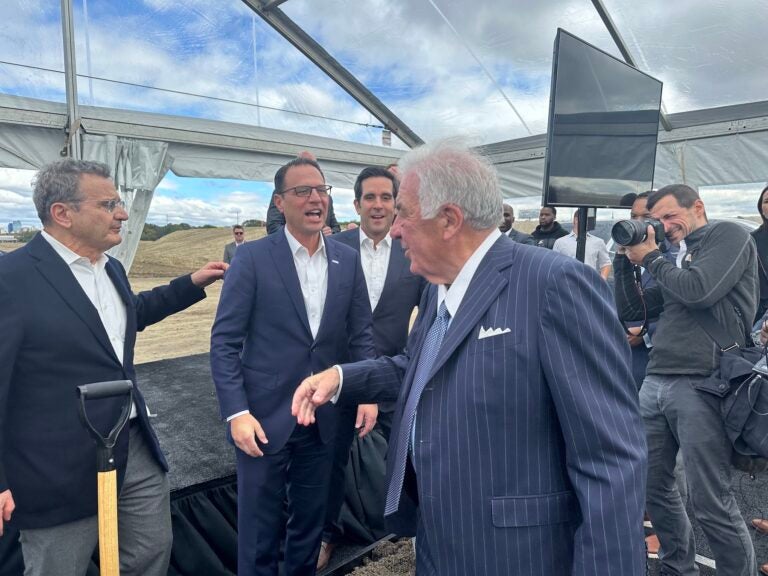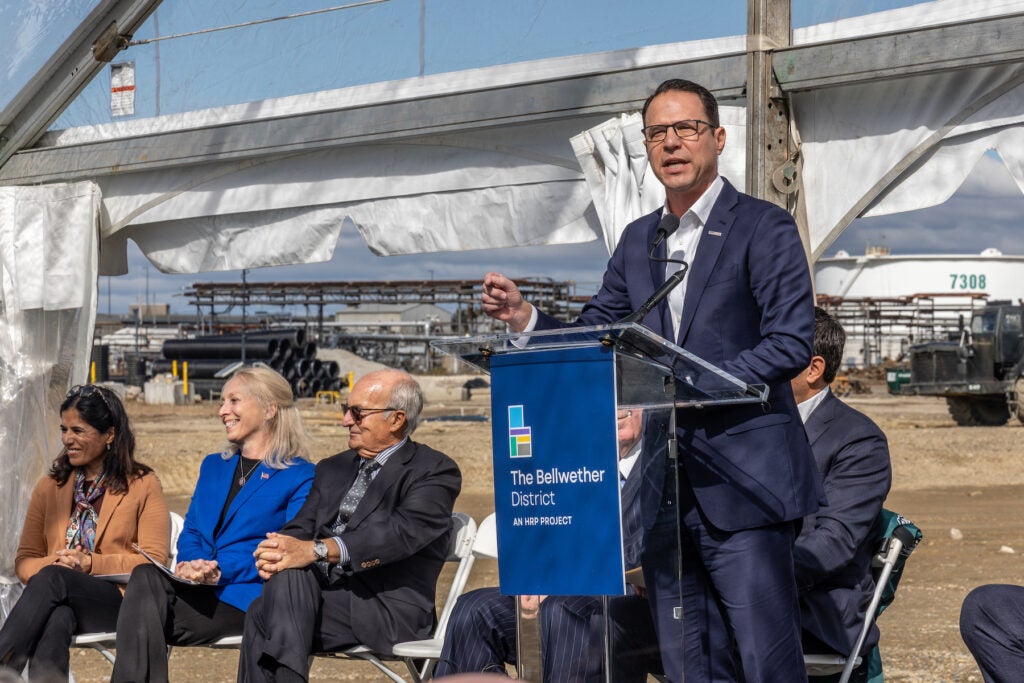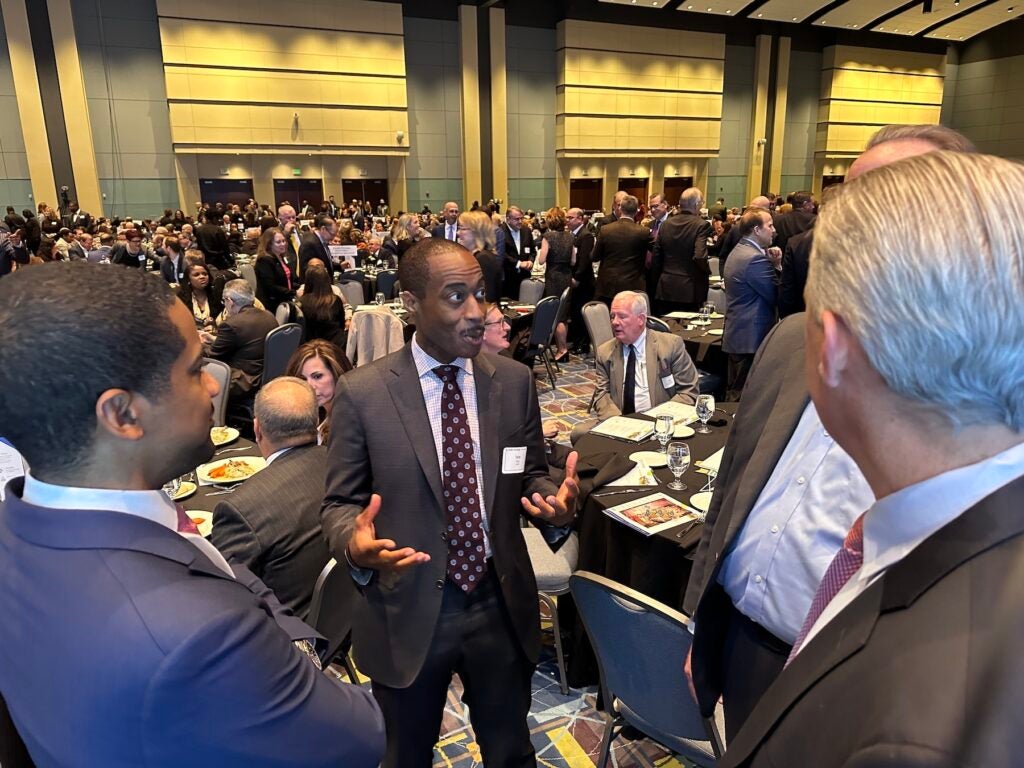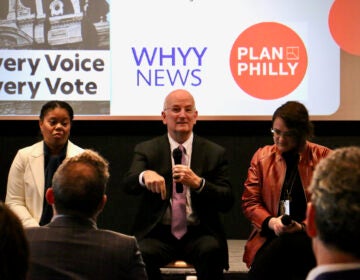Could Philly’s mayor-elect run the city like Gov. Shapiro leads the state?
Philly’s business owners say they want a city government that’s willing to make it easier for economic development by streamlining licensing and permitting processes.
Listen 6:24
Pennsylvania Gov. Josh Shapiro and Hilco CEO Roberto Perez chat with William Sasso Chairman Emeritus at Stradley Ronon during the groundbreaking of The Bellwhether District, a former oil refinery that's expected to be retrofitted as a new commercial and industrial site. (Kristen Mosbrucker-Garza/WHYY)
From Philly and the Pa. suburbs to South Jersey and Delaware, what would you like WHYY News to cover? Let us know!
If anyone in Pennsylvania’s state government has the empathy to understand the average person — whether a business owner seeking a permit or a resident asking for unemployment assistance — it might just be Bry Pardoe.
That’s because it’s her job as an executive for digital experience at the state to put humans at the center of government processes instead of just the rules that require mental acrobatics for everyone to follow.
Pardoe’s job exists because of the leadership of Pennsylvania Gov. Josh Shapiro — a Democrat in a state that has its fair share of Republicans outside its two big cities of Philadelphia and Pittsburgh.
Since being sworn into office in January 2023, Shapiro has pushed some bureaucratic tendencies of state government aside — from an emergency no-bid construction contract to rebuild a collapsed section of I-95 to streamlining state permits — in an effort to improve the economic competitiveness of the region.
Now Philadelphia’s Mayor-elect Cherelle Parker, also a Democrat, will build her own administration to start work in January 2024.

Business owners told WHYY News they will pay attention to how Parker implements her vision, especially the sense of urgency to improve the city and build its tax base as a city with fewer large privately held companies compared to similar markets.
Many business leaders over the past year — on the campaign trail for the city’s 100th mayor — have lamented about the city’s ease of doing business under the Jim Kenney administration, which had many efforts initially derailed by the COVID-19 pandemic that began four years ago.
The statewide economic growth challenges are similar to issues across Philadelphia in several ways: higher corporate and wage taxes, the aging population of taxpayers, andn some difficulty attracting or retaining both talent and new businesses.
Before she was elected as mayor, Parker told WHYY News that she’s aware of Philly’s ‘biggest but poorest city’ in the nation dynamic but was confident that her plan could lift more households out of poverty.
“It’s about growing the tax base,” Parker said in early October 2023. “Firms are making decisions about whether or not they will locate or begin here in our city. They have to determine whether or not the environment will be safe for the workforce and if we have a prepared workforce.”
At the state level, Gov. Shapiro has relied upon the stroke of his pen — specifically, the governor’s executive order power – to spark his accomplishments so far.
“We’re cutting through red tape in Pennsylvania,” Gov. Shapiro told a crowd of business professionals and political influencers in mid-October.
The first-term governor stood on the construction site of what was once a South Philly oil refinery with a view of the city skyline behind him that’s undergoing environmental remediation and redevelopment as an industrial campus. He touted that the state can keep up with a steady flow of economic development projects.
“We’re moving quicker on permits and to get dollars into important projects like this,” he said about permitting time frame reform and abbreviating economic incentive applications.

For example, the statewide Redevelopment Assistance Capital Program application — used by the oil refinery redevelopment project — was winnowed down from 22 pages to 6 pages in the last 11 months.
“We are streamlining our processes and moving at the speed of business and to have Partners like Hilco with us that sets a new tone and new example for the new day here in Pennsylvania,” Gov. Shapiro said. “We’re going to use this as an example to get other shovel ready projects ready…to attract more employers.”
Beyond that, as of Nov. 1, any resident or business operating in the state can participate in Gov. Shapiro’s “money-back guarantee” program. That means the state could start issuing refunds within 45 days of some state license and certification fees if applications are not processed within a defined time frame.
The program is not retroactive but the goal is to “issue zero refunds” because the state is hyper-focused on questioning why a process should be done a certain way — not just enforcing rules because there’s a longstanding practice of doing so.
In January 2023, Gov. Shapiro issued an executive order to standardize the turnaround time for all state agencies in regards to permits, licenses and certifications. By March 2023, the state created a catalog for all 2,400 total permits, licenses, and certifications.
For example, the Department of State reduced the average processing time for business and corporate filings from eight weeks to three days.
As executive director of The Commonwealth Office of Digital Experience, otherwise known as CODE PA, Pardoe said that it was not an easy task.
“The public sector has so much nuance,” Pardoe said. “There are things that are legislatively driven or policy driven that are not easy to anticipate.”
Often it’s not possible to simply take a decades-old 37-step-long permitting process and trim it down to four steps without “due diligence and process to figure out how” it can be done, she said. But even when a process is streamlined in one state agency, it’s not directly transferable knowledge to another program because there’s different technology and even administrative structures.
“A lot of times we’re a conduit between business and IT, translating the requirements of what our business partners need,” Pardoe said. “This is a big challenge. I think every city and state across the country is trying to figure out how to be more efficient in permitting and making it easier to do business in the state.”
In some agencies, the state hired more workers. In others, there was investment in new technology.
Pardoe said her advice for the next city administrators interested in tackling the same issue is to “put the human at the center ” of the process — not at the end.
That includes empathy with both the customer and the state worker doing the task, and easing into a culture shift without undue fear that technology will replace human jobs, she said.
But nothing is possible without a leader dedicated to helping move such “giant boulders” she said.
“It’s really easy in government to get so caught up in things like, ‘We have 37 steps and we’ve been doing these 37 steps forever and 15 years ago someone told us we had to add this…and we’re not going to change that process,” she said.

Meanwhile, local municipalities like cities must operate in accordance with their own municipal code. Philadelphia has a home rule charter and during City Council meetings members introduce new legislation which could potentially change the city laws each year.
That doesn’t mean the city hasn’t invested in human-centered design — it has with the redevelopment of the city’s website Phila.gov, which focused more on user experience rather than bureaucratic structure. But it’s unclear how much those efforts about innovation and streamlining city government will continue and how they will be shaped and focused under a Parker administration.
Even existing city efforts to streamline the process can get lengthy from an outside perspective. The most recent and basic guide to permits and licenses to open a stationary food business in the city of Philadelphia is 23 pages long with nine different sections for just the document checklist, which doesn’t include any additional state and federal requirements.
“The governor is doing a great job where he’s created an initiative to streamline ease of business. There are all these things that they’re doing at the state level that I think are replicable at the city level,” said David Adelman, Campus Apartments CEO and chairman of 76 Devcorp, which seeks to build a new 76ers NBA team arena in Center City. “And if we do that, we show that Philadelphia’s open for business.”
So far, Philadelphia’s Mayor-elect Parker is starting the transition. Her committee is co-chaired by Della Clark, president of The Enterprise Center, a hub in West Philadelphia that helps entrepreneurs, and Greg Segall, CEO of Versa Capital Group and a private equity investor.
In October, Parker said her priorities would be public health and safety to lift the city residents out of poverty.
“That means I’m gonna make some tough decisions that some people are not going to like,” she said. “But I ask Philadelphian’s to give me a shot doing this, hiring the best and the brightest because I also don’t purport to be superwoman so I can’t do it all. I want to hire a team of the best and brightest to help us move our city forward to make it safe and make it clean. There’s a sense of lawlessness that right now seems to be gaining ground and steam.”

Parker said that she’s not always publicly supported when she acknowledges the city’s problems.
“And if you talk to people in our city, some people get frustrated when I acknowledge that publicly. That’s because they don’t want to really acknowledge how people feel who live here, who work here, who own a business here, who are stakeholders here,” she said. “And we have to address that in a holistic perspective. That is how I would change poverty. Put people on a path to self-sufficiency, that means giving you the ability to earn a living for yourself. And so you’re not relying on the government like my grandparents were. The only way I want you interacting with the government is to pay your taxes so we can continue to strengthen our tax base.”

Get daily updates from WHYY News!
WHYY is your source for fact-based, in-depth journalism and information. As a nonprofit organization, we rely on financial support from readers like you. Please give today.







